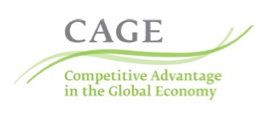The UK vote to leave the European Union is widely seen as a watershed moment in UK history and European integration. Why did some areas vote to leave the EU, and others to remain? What lessons can be drawn from the referendum other than the result itself?
This paper was written by Thiemo Fetzer, Associate Professor in Economics at the University of Warwick in conjunction with the SMF and CAGE briefing event of the same name.
About the author:
Thiemo Fetzer is an Associate Professor in the Department of Economics at the University of Warwick. He is also affiliated with the Pearson Institute at University of Chicago, the Spatial Economics Research Group at London School of Economics and the Centre for Competitive Advantage in the Global Economy (CAGE) at Warwick. He has completed his PhD in Economics at the London School of Economics and held a visiting appointment at the Harris School of Public Policy at the University of Chicago. Thiemo has worked as consultant for the World Bank, the International Monetary Fund and the United Nations.
Thiemo’s research interest lie in the fields of political economy, development and natural resources and his work has been published in journals, including the Economic Journal, the Journal of International Economics, the Journal of Development Economics and the Journal of the European Economics Association.
His current ongoing research includes work identifying and quantifying the economic origins of political instability and studying the economic drivers of populism in the context of the UK and the EU as a whole.

